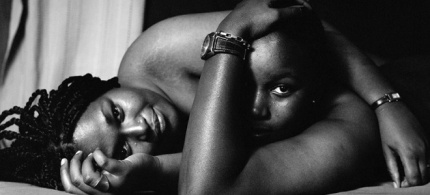Homosexuality and African history:
the roots of the criminalisation
of homosexuality
Apinda Mpako and Ayanda Magudulela, Parktown, Johannesburg; Being series, 2007 (Photo by Zanele Muholi) ©Michael Stevenson. Last month, Zanele Muholi was honoured with an international Freedom of Expression prize at the Index on Censorship awards for creating a visual archive of black lesbian life in South Africa.
Just over a week ago, South Africa continued to pave the way on gay rights with its first traditional gay wedding, but anyone who bet against the same old comments about how homosexuality is “un-African” being wheeled out again surely lost their money with the very first report. Why does this idea persist, and where did it come from?
In the paper “Homosexuality in the African context”, Busangokwakhe Dlamini quotes Kendall K. Limakatso as saying:
‘homophobia is far more likely to qualify as “un-African” than homosexuality…homophobia is certainly the product of a certain class of white folk, arising from a particular culture which only seems normative to us because we are blinded by it.’
Kendall is often quoted in discussions around homosexuality in Africa due to her research on same-sex relationships and sexuality among Lesotho women. Kendall spent a couple of years in Lesotho in the early 1990s; initially hoping to find women who identified as lesbians like herself, she was disappointed to discover that no Mosotho woman identified as lesbian. Yet some of the women who befriended Kendall became comfortable enough to reveal to her that it was not uncommon for women to kiss each other passionately in private, away from the gaze of men. Not limited to kissing, there were instances of tribadism, rubbing, fondling and oral sex betweenBasotho women who described these instances as women simply “loving each other” or “having a nice time together” while at the same time insisting that what they did was not. Still Kendal reached the conclusion that Basotho women were aware of the erotic nature of their relationships with other women, even if they did not view their encounters as sexual. To these women, the erotic nature of their relationships with other women did not count as sex because to them sex involves a penis. One Mosotho woman, Mpho ‘M’atsepo Nthunya, spoke candidly about how her “special friend” chose her, and how elaborate feasts were celebrated to show the commitment between the two of them. These feasts involved eating, drinking, dancing, the exchange of gifts, and the ritual sacrifice of animals in what would seem like a wedding. The ceremonies were observed by other people, including the women’s husbands, all of whom knew and accepted that the two women were making a commitment to each other.
No matter that these feasts resembled weddings, they are not weddings, and yet these lesbian-like institutions are part of tradition, and suggest that in the pre-colonial past there were similar instances in which women formed intimate and erotic bonds that were publicly acknowledged and honoured. Kendall’s research highlights a very important aspect that is often overlooked in the battle to place, or to completely remove, homosexuality in African history. That indigenous African worldviews do not have names for same-sex relationships does not necessarily mean that such relationships were alien. The field of sexuality in Africa remains largely understudied, but we cannot assume that our ancestors would have regarded homosexuality as taboo even if they did not have a name for it.

Interactive map of the criminalization of homosexuality HERE. Download the International LGBTI Association State-Sponsored Homophobia REPORT and MAP.
We can thank European colonialism for the reconstruction of indigenous African modes of thinking and philosophy.Colonialism is also the root of the criminalisation of homosexuality that still persists in most post-colonial African countries, and also the crafting of identities on the basis of sexual preferences. At the same time, colonialism brought new terms in which sex is/was understood as well as encouraging the rise of homosexual identity as a social lifestyle. In the present day, while Western governments push for African governments to have more friendly approaches towards gay rights – counter-productively, because the harder they push, the more African governments resist what they see as neo-colonial meddling – other Western institutions, most of them religious, have encouraged anti-gay sentiment in countries like Uganda.
Notwithstanding, the West continues to be a role model for Africans who identify as lesbian, gay, bisexual and transgender, intersex, queer, woman-loving-woman or man-loving-man. Almost all the lesbian and bisexual women I know in Nigeria paid close attention to the recent proceedings of the US Supreme Court consideration of equal marriage rights for same-sex couples in the United States, as I’m sure other gay Africans did. It generated a lot of discussion, an indication that more Africans than ever before that talking openly about gay rights. A fair amount of gay-rights activists in African countries feel that marriage should not be a priority, which suggests that there is critical engagement with cues from the West. After all, few people are aware that one of the most important challenges facing LGBTQ youths in the United States is homelessness, with up to 40% of homeless youths being LGBTQ. That African activists place the removal of archaic colonial laws criminalising homosexual activity, as well as fair access to housing, employment and healthcare, on the priority list is excellent.
In the meantime, media reports on how brutal it is to be a gay person in an African country while much needed, ought to be more balanced. While we should not ignore the fact that the legal status of gay people in most African countries is horrendous, we should also keep in mind that different spectrums of the LGBTQ community continue to thrive in even the most staunchly anti-gay countries in Africa.

